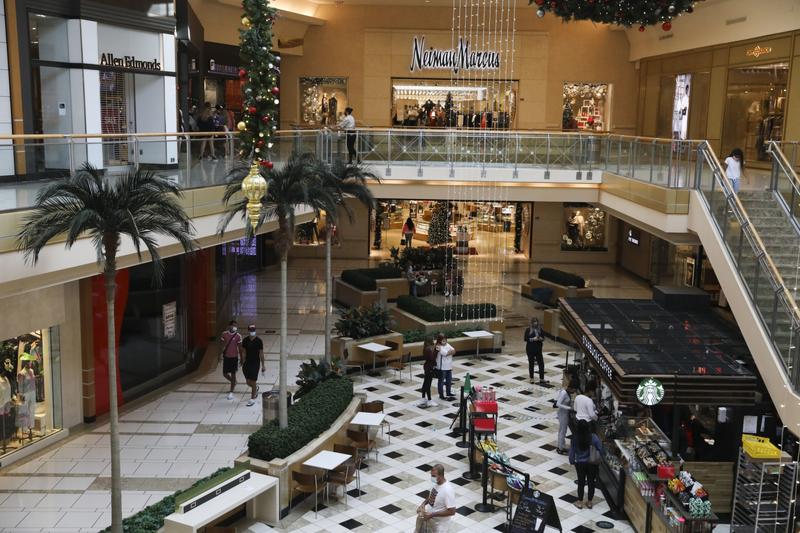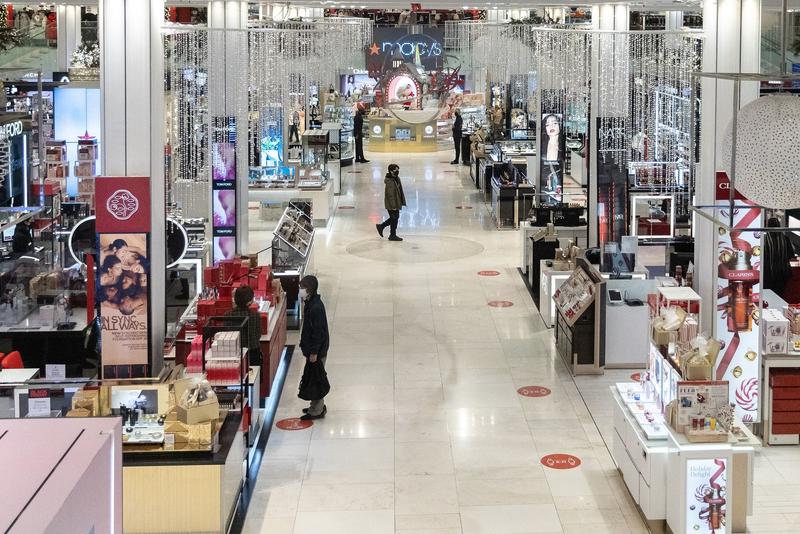 Shoppers walk through the International Plaza and Bay Street Mall in Tampa, Florida, US, Nov 27, 2020. (PHOTO / BLOOMBERG)
Shoppers walk through the International Plaza and Bay Street Mall in Tampa, Florida, US, Nov 27, 2020. (PHOTO / BLOOMBERG)
Black Friday - once the ultimate US shopping day - is being disrupted like so much else in these COVID-19 times, with consumers largely avoiding malls and instead flocking online.
What that means for overall sales for the holiday season remains to be seen, but it’s becoming clearer that the pandemic has only accelerated the move away from big in-person shopping events that have defined American consumerism for the better part of a century.
After debuting and expanding online services during the pandemic - from video chats to in-car order pickup - retailers are now stress-testing how well the new options work in the busiest and most-crucial shopping part of the year. Brands also extended their promotions for a longer time this year, with many starting in October. If the industry can produce a solid fourth quarter during a recession and a pandemic, it’s hard to see it turning back to the old ways.
ALSO READ: E-commerce eyes Black Friday windfall
“Black Friday became Black November; now it’s Black October and Black November,” said Doug Stephens, founder of consulting firm Retail Prophet. “Soon, we’ll be looking at a Black Quarter.”
After debuting and expanding online services during the pandemic - from video chats to in-car order pickup - retailers are now stress-testing how well the new options work in the busiest and most-crucial shopping part of the year
So far, the Black Friday weekend produced mixed results. Thanksgiving Day online spending came in nearly US$1 billion lower than predicted in the US, according to Adobe Analytics. But an online sales record could be set on Friday with as much as US$9.6 billion, it said, only to be overshadowed by Cyber Monday, when sales could reach US$13 billion.
The holiday season is still expected to top last year thanks to increased savings rates and higher disposable income, according to Craig Johnson, president of Customer Growth Partners.
“It’s like US$1.2 trillion of dry powder to spend for Christmas,” Johnson aid.
GameStop rose 9 percent after shoppers lined up at its stores for the hit item of the season: new gaming consoles from Microsoft and Sony. Etsy, the online marketplace for handmade goods, surged 11 percent - easily the biggest gain in the S&P 500.
In-store visits appeared lackluster. A decade ago, Black Friday was defined by long lines US shoppers waiting to get into malls and Walmart stores. That intensity has waned over the years, and it dwindled to a trickle in 2020. Many Americans remain wary of public places during the resurgent pandemic.
Sparse shopping
Inside Macy’s Inc’s Manhattan flagship, it looked like a normal day, instead of what’s supposed to be the busiest shopping event of the year. In the past, the location featured a bonanza of patrons amid television news crews.
Black Friday became Black November; now it’s Black October and Black November. Soon, we’ll be looking at a Black Quarter.
Doug Stephens, founder ofconsulting firm Retail Prophet
At Atlanta’s Atlantic Station, the scene was mixed. Around noon, the Dillard’s had only a handful of shoppers browsing aisles while groups of employees anxiously hovered nearby, ready to help. Meanwhile, the Bath & Body Works teemed with customers and the adjacent Victoria’s Secret had a line. Even struggling Banana Republic filled up. At Old Navy, an employee ran out the door to deliver an online order to a customer’s waiting car.
“Curbside pickup is going to stick for sure,” said Deloitte vice chairman Rod Sides. “It will continue to grow over time.”
The biggest buzz in many shopping centers came at GameStop, where customers lined up for a chance to buy a PlayStation 5 or the latest Xbox. The newly released video-game consoles have been hard to find.
But even these scenes reflect the broader shift to e-commerce. Scalpers using software, often called bots, sucked up online inventory and posted it for sale on the secondary market at twice the sticker price or more, according to reports. So camping out was the best chance for many.
 Customers wearing protective masks shop at Macy's store during Black Friday on Nov 27, 2020 in New York. (PHOTO / BLOOMBERG)
Customers wearing protective masks shop at Macy's store during Black Friday on Nov 27, 2020 in New York. (PHOTO / BLOOMBERG)
All-nighter
At a quarter to midnight on Thanksgiving, Daniel Buffenbarger, a 32-year-old from Ludington, Michigan, tried his luck online. He failed three times on Walmart.com to get the new PlayStation, which he planned as a Christmas gift for himself. He also entered an online queue on the website for Meijer, a Midwest supermarket that also sells electronics. When he saw that 222,000 people were in front of him, he doubted his chances. But around 6 a.m., after staying up all night, his number came up, and he made the purchase.
“It was joyful,” said Buffenbarger, who works as a cook at a KFC and scheduled an in-store pickup for his PlayStation later Friday. “It made my exhaustion go away.”
Many retailers have deployed video chats and other one-on-one communication options during the pandemic, and shoppers continued to use them on Black Friday. At Chico’s FAS Inc., store employees are contacting clients virtually to show them new shoes and jackets, according to CEO Molly Langenstein.
“It’s another way of reaching out to customers, especially for the Black Friday weekend, and going for customers who aren’t comfortable to go into a store,” Langenstein said in an interview.
Ultimately, the benefits of shopping in-person remain a draw for some. At International Plaza and Bay Street mall in Tampa, Florida, Christine Able wanted to buy the only item she couldn’t find online: a gift for her son from Lululemon that had been out of stock on the website. With digital options failing her, she woke up early to stand in line before the store opened at 9 am.
READ MORE: World shares post modest losses in 'Black Friday' retreat
Joe Cavaliere, who lives in Pensacola, Florida, was in the Tampa area for the holiday and shopped the Louis Vuitton store to get his wife a handbag that he couldn’t find at his local mall.
“I like the experience of coming into the store,” he said. “I don’t know what I will get when I buy something online. I like seeing exactly what I am buying.”


